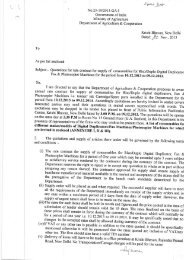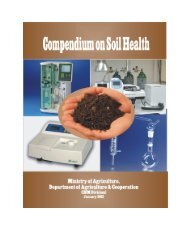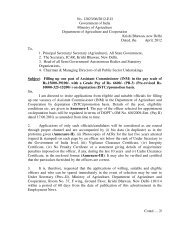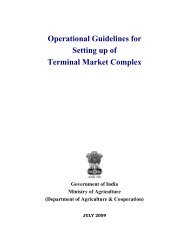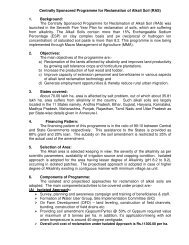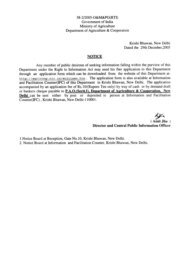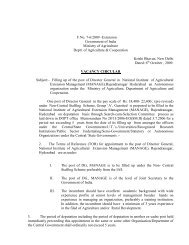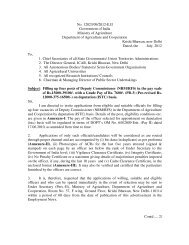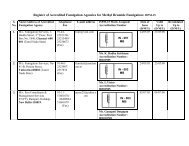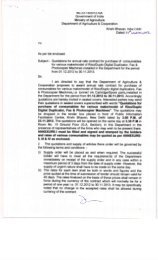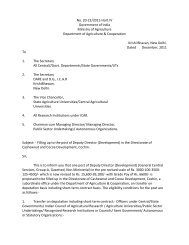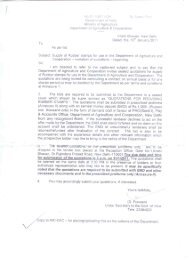Annual Report 2009-2010 - Department of Agriculture & Co-operation
Annual Report 2009-2010 - Department of Agriculture & Co-operation
Annual Report 2009-2010 - Department of Agriculture & Co-operation
Create successful ePaper yourself
Turn your PDF publications into a flip-book with our unique Google optimized e-Paper software.
Rajasthan, Gujarat, and Haryana, has 10 Circle<br />
Offices located at Bikaner, Jaisalmer, Barmer,<br />
Jalore, Nagaur, Phalodi, Churu, Suratgarh,<br />
Palanpur, and Bhuj. Its field headquarter is<br />
located in Jodhpur and its central headquarters<br />
in Faridabad. Besides, there is a Field Station for<br />
Investigations on Locusts (FSIL) in Bikaner. To<br />
strengthen locust monitoring, remote sensing<br />
images are being used. The LWO maintains its<br />
own wireless network for exchanging<br />
information on locust surveys and control<br />
between locust outposts, circle <strong>of</strong>fices and<br />
headquarters in Faridabad. Wireless<br />
communication between Jodhpur (India) and<br />
Karachi (Pakistan) is also maintained every year<br />
from June to November for exchanging locust<br />
intelligence between the two countries. Six Indo-<br />
Pakistan border meetings were conducted at the<br />
Munabao (India)/Khokhrapar (Pakistan) border<br />
point during <strong>2009</strong>-10. Eighteen locust situation<br />
bulletins were issued, and an area <strong>of</strong> 217 lakh<br />
hectares was surveyed during locust surveys<br />
conducted in the SDA.<br />
7.16 Capacity Building in Plant Protection: The<br />
National Plant Protection Institute (NPPTI),<br />
Hyderabad was converted during 2008-09 into a<br />
society to give it more autonomy. The institute,<br />
re-named as the National Institute <strong>of</strong> Plant Health<br />
Management (NIPHM), is headed by a Director<br />
General. Its facilities would be upgraded and<br />
faculty expanded for training in plant protection.<br />
NIPHM would be developed as the premier<br />
institution for capacity building in South Asia.<br />
During <strong>2009</strong>-10 (up-to 20 January <strong>2010</strong>), 35<br />
regular courses were conducted at NIPHM, in<br />
which 1,029 trainees from various states and<br />
organisations were trained in different aspects<br />
<strong>of</strong> plant protection. The meetings <strong>of</strong> the General<br />
<strong>Co</strong>uncil and the Executive <strong>Co</strong>uncil <strong>of</strong> the Institute<br />
were held on 30 September <strong>2009</strong>.<br />
7.17 National Agricultural Biosecurity System:<br />
In view <strong>of</strong> the threat perception to the biosecurity<br />
<strong>of</strong> the country on the account <strong>of</strong> increasing<br />
international trade, emergence <strong>of</strong> trans-boundary<br />
diseases <strong>of</strong> plants and animals (such as Ug-99<br />
wheat stem rust and avian influenza),<br />
introduction <strong>of</strong> genetically modified organisms,<br />
climate change, and bio-terrorism, the Ministry<br />
<strong>of</strong> <strong>Agriculture</strong> has prepared a proposal for putting<br />
in place a National Agricultural Biosecurity<br />
System (NABS). The proposal is based on the<br />
recommendations <strong>of</strong> the National <strong>Co</strong>mmission<br />
on Farmers headed by Pr<strong>of</strong>. M.S. Swaminathan,<br />
and the National Policy on Farmers, 2007. The<br />
proposal envisages the creation <strong>of</strong> an<br />
autonomous National Agricultural Biosecurity<br />
Authority (NABA) for which an Agricultural<br />
Biosecurity Bill will be brought forth.<br />
Plant Protection<br />
43



